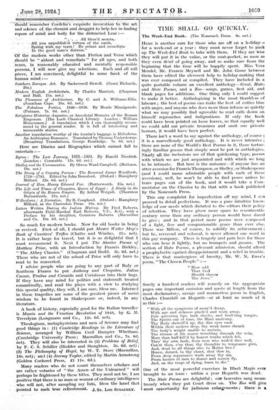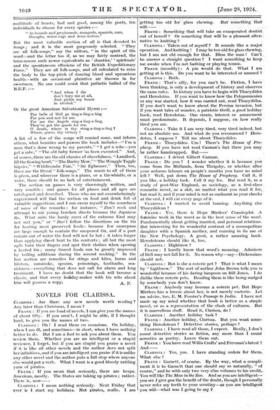TIME SHALL GO QUICKLY.
The Week-End Book. (The Nonesuch. Press. 6s. net.) HERE is another care for those who are off on a holiday-- for a week-end or a year : they must never forget to pack up The Week-End Book to take with them. If they are wise they will put it in the valise, or the coat-pocket, as soon as they even think of going :limy, and so make sure from the beginning that the time will be happily spent. Miss Vera Mendel, Mr. Francis Meynell and Mr. John Gosse between
them have edited the cleverest help to holiday-making that
was ever composed or compiled. They have included in a quite portable volume an excellent antbology-L-Greed, Hate, and State Poems, and a Zoo-songs, games, first aid, and blank pages for additions. One thing only I could suggest
to make it better. Nnthologizing is the most thankless of labours ; the best of poems can make the best of critics blue with anger, and anyone who does more than inform us quietly what we may possibly find agreeable to read calls down on himself reproaches and indignations. If only the book could have been printed on loose leaves, so that equally well we could add our private treasures and omit our private horrors, it would have been perfect.
There isn't a word to say against the anthology, of course ; it is a marvellously good anthology. It is never intrusive ;
there are none of the World's Best Poems in it, those tortur- ingly familiar poems that simply must be put in anthologies.
Nearly all the inclusions are of that quickening type, poems with which we are just acquainted and with which we long
to be intimate. But here is the nuisance-if anyone has an utter aversion for Francis Thompson, or Shelley, or Shakespeare (and I could name admirable people with each of these aversions), well, he won't be able to find peace unless he tears pages out of the book, and it would take a Com- mentator on the Classics to do that with a book published by the Nonesuch Press.
This one complaint for imperfection off my mind, I can proceed to detail perfections. It was a pure intuitive know- ledge of our needs which dictated to the editors their policy of selection. They have given more space to seventeenth- century verse than any ordinary person would have dared
to give ; and in that period more poems were composed
of a light, free and companionable grace than ever else. There was Milton, of course, to solidify its achievement ; but he, reverend and colossal, is never allowed one word in this gay company. There is tragedy and pain here for those who can bear it lightly, but no trumpets and groans. The section of Hate Poems, a pleasant admission, should afford a prophylactic against disappointment and a relief in trouble.
There is that masterpiece of brevity, Mr. W. N. Ewer's poem, "The Chosen People" :- " How odd That God
Should choose The Jews."
Surely a hundred readers will remedy on the appropriate pages one important omission and quote at length from the most declamatory, savage and mannerless poem in English, Charles Churchill on Hogarth-or at least so much of it as this With all the symptoms of assur'd decay, With age and sickness pinch'd and worn away, Pale quivering lips, lank checks, and fault'ring tongue, The Spirits out of-tune, the Mind unstrung, Thy Body shrivell'd up, thy dim eyes sunk Within their sockets deep, thy weak hams shrunk The body's weight unable to sustain, The stream of life scarce trembling through the vein, More than half-kill'd by honest truths which fell, Thro' thy own fault, from men who wish'd thee well, Can'st thou, e'en thus, thy thoughts to vengeance give, And, dead to all things else, to Malice live ? Hence, dotard, to thy closet, shut thee in, From deep repentance wash away thy sin, From haunts of men to shame and sorrow fly, And, on the verge of dying, learn to die."
One of the most powerful exercises in Black Magic ever brought to an issue : within a year Hogarth was dead.
The Stole Poems are delightful ; our laureates sang mons- trously when they put Court diess on. The Zoo will give most opportunity for judicious enlargements ; there is a
multitRde of beasts, bad and good, among the poets, ten individuals to choose for every species
" As hounds and greyhounds, mongrels, spaniels, curs, Shoughs., water-rugs and demi-wolves."
But the most valuable section of all is that devoted to Songs ; and it is the most gorgeously selected. " They are all folk-songs," say the editors, " in the spirit of the word—and the letter too if, as we may fairly contend, the term covers such newer- equivalents as ' shanties," spirituals' and the spontaneous effusions of the British Expeditionary Force." They are all folk-songs, and all calculated to raise the body to the top pitch of dancing blood and uproarious health—with an occasional plaintive air thrown in for sweetness. No one could resist that pathetic ballad of the
B.E.F.:- " And when I die don't bury me at all, Just pickle my bones in alcohol."
Or the great American Salvationist Hymn :—
The bells of Hell go ting-a-ling-a-ling For you and,not for me.
For me the Angels sing-a-ling-a-ling, They've got the goods .for me, 0 death, where is thy sting-a-ling-a-ling ? Where, grave, thy victory ?
A list of a few of the songs will remind some, and inform others, what beauties and powers the book includes—" I'm a man that's done wrong to my parents," "I got a robe—you got a robe," " The old baby farmer 'as been executed." And, of course, there are the old classics of cheerfulness, " Landlord, fill the flowing bowl," " The Barley Mow," " The Wraggle Toggle Gipsies," " Widdicombe Fair," " Sir Eglamore." Then, too, there are the literal " folk-songs." The music to all of them is given, and wherever there is a piano, or a tin-whistle, or a voice, there should be no lack of entertainment.
The section on games is very charmingly written, and
very sensible ; and games for all, places and all ages are catalogued and described. Those who are not overwhelmingly
experienced will find the section on food and drink full of
valuable suggestions, and I can swear myself to the soundness of some of the remarks ; for instance, " Don't cook and
attempt to eat young bracken shoots because the Japanese do. What suits the hardy races of the extreme East may
not suit you," or " Don't follow the directions on the tin for heating most preserved foods : because few saucepans
are large enough to contain the unopened tin, and if a part remain out of water the food will not be hot ; it takes longer than applying direct heat to the contents ; all but the most agile burn their fingers and spot their clothes when opening a heated tin ; many tinned foods can be greatly improved by trifling additions during the second cooking." In the last section are remedies for stings and bites, burns and blisters, sunstroke, sprains, poisonings, toothache, sea- sickness—everything that does not call for alarm and long treatment. I have no doubt that the book will become a classic, and that every holiday-maker with his wits about















































 Previous page
Previous page